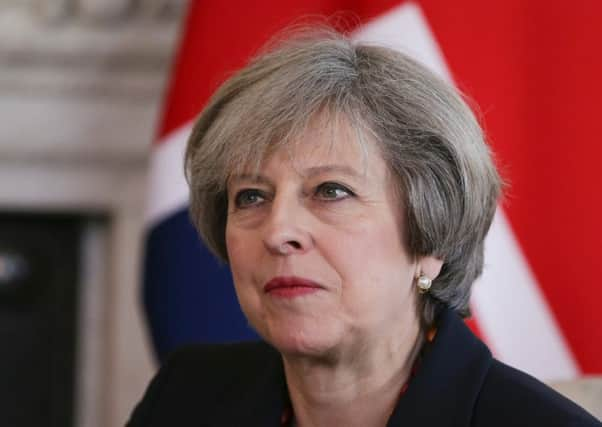Theresa May orders ministers to make case for the Union


A Cabinet meeting yesterday was dominated by discussion of the need to “maintain, strengthen and nurture” the 300-year-old bond between the nations of the UK, with ministers told their departments should “listen to and engage with the devolved administrations”.
Downing Street said the meeting reflected the Prime Minister’s commitment to protect the Union as the UK navigates difficult Brexit negotiations over the next two years.
Advertisement
Hide AdAdvertisement
Hide AdHowever, it comes with talks between the Scottish and UK governments on the approach to those negotiations at an impasse, with less than six weeks until the government formally triggers Brexit.
Independence campaigners have begun raising funds in expectation of an announcement within weeks, with Scottish Government ministers talking up the likelihood of second referendum.
An SNP spokesman claimed the meeting was a sign the UK government was “clearly rattled”.
Scottish Secretary David Mundell will today tell MSPs that there are no circumstances under which Scotland could stay in the EU after Brexit, warning Nationalists that Scotland would find itself outside the bloc even if they push for an early independence referendum.
“I think it is important to be clear, because there has been a lot of public debate on this point – that Scotland will not be in the EU at the end of this process,” Mr Mundell is expected to say when he appears before the Scottish Parliament’s culture, tourism, Europe and external relations committee.
“There is no set of circumstances in which Scotland could remain a member of the EU after the rest of the UK has left.
“If Scotland’s constitutional position were ever to change, it would have to apply to be a member of the EU afresh and we should not make easy assumptions about the length of time this would take, the process Scotland would have to follow or the terms of membership that may be on offer.”
Mr Mundell’s comments follow a report by two leading academics which suggested Scotland could be back in the EU by 2023 if it voted for independence after Brexit
Advertisement
Hide AdAdvertisement
Hide AdTobias Lock, from the University of Edinburgh, and Kirsty Hughes, of Friends of Europe, said there was “considerable political goodwill to Scotland in EU capitals since it is facing Brexit despite having voted to remain”, and that “that political goodwill, on current trends, is likely to feed into an effort to fast-track Scotland’s EU membership in the event of a successful independence vote”.
Whitehall officials are considering Scottish Government proposals to keep Scotland inside the European single market, but Downing Street has ruled out any special Brexit deal that allows a different relationship with the EU on opposite sides of the Border.
Both governments say talks will continue ahead of a 31 March government deadline for triggering Article 50.
Responding to the discussion at Cabinet, an SNP spokesman said: “This shows the Tories are clearly rattled at how their actions are being seen by people across Scotland – and they have good reason to be.
“They talk about listening seriously to Scotland, but their actions tell a completely different story – underlined by the fact the UK Cabinet failed to discuss the Scottish Government’s compromise proposals on Europe. The Tories now seem to think they can do what they want to Scotland and people will simply accept it.
“They may discover just how wrong they are about that if they continue trying to drag Scotland out of Europe against its democratic will and in their reckless pursuit of a hard Brexit, which threatens to take Scotland and the rest of the UK off an economic cliff-edge, with catastrophic consequences for jobs and livelihoods.”
A Scottish Tory party spokesman said: “Rather than launching daft attacks on UK Cabinet agenda, the SNP government should be asking why fewer and fewer people in Scotland want a second referendum on independence. The answer is because most Scots know that protecting our own Union is vital to our future security and prosperity.”